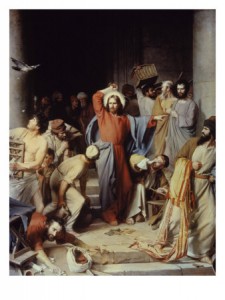
Lots of people claim to know what it is about human behavior that upsets God. But if we’re talking about the God who Jesus revealed, there was really only one thing that absolutely made Him wig out.
He came to a time and place when there was a lot of bad stuff going on. The Jewish leaders were oppressing the general Israelite populace; the Romans were oppressing everybody; King Herod was in cahoots with the Romans and — by the way — imprisoned and beheaded Jesus’ baptizer cousin John for “outing” his adulterous murderous ways.
While Jesus of Nazareth spoke out against some of this, only one thing made Him completely lose his cool. It was the tables of the money changers.
Banking historians point to this kind of practice by ancient religious authorities as the precursor to our current monetary system. The money changers were part of the Temple worship whereby only specially raised animals could be offered for sacrifice, and only special Temple coins could be used to purchase the special animals. Also, every Israelite male had to “redeem” himself with a pure silver (some say gold) Temple half-shekel piece. Not only were the animals overpriced, but the money changers charged a hefty “origination fee” for implementing this official monetary policy. And everybody had to participate.
Sound familiar?
FDR alluded to this in his famous 1933 “Fear Itself” inaugural speech:
The money changers have fled from their high seats in the temple of our civilization. We may now restore that temple to the ancient truths. The measure of the restoration lies in the extent to which we apply social values more noble than mere monetary profit.
The current crisis is a result of the undoing of Pres. Roosevelt’s “New Deal” restrictions on investment banks.
Should we be looking for God’s hand in what’s been happening? Has He once again overturned the tables of the money changers”?

{ 2 comments… read them below or add one }
Jesus displayed not anger but righteous indignation over the defiling of His Father’s house, according to one exegete. If so, there is nothing in human nature that upsets God. Such upset is simply a projection of our own imperfect nature. How can God be God and be upset at such behavior anyway? I think that if anything can cause God a tear it is human rejection of His love and the great suffering that it causes us, not Him. Still, it is hard to imagine a perfect being being injured by our shenanigans.
Can it be a surprise to anyone that humans will overreach for gain when the opportunity presents itself as occurred in the latest finanacial scandal? Heck, I personally have witnessed bad things happening when some person “in authority” gives a slight nod to connivers. These nods earn something for the nodder and their buddies as well as for the noddees. The answer is not more blaming, prosecuting, laws, regulations, or watchdogs. It is right thinking and living which can be encouraged with appropriate rewards.
When it was almost time for the Jewish Passover, Jesus went up to Jerusalem.In the temple courts he found men selling cattle, sheep and doves, and others sitting at tables exchanging money. So he made a whip out of cords, and drove all from the temple area, both sheep and cattle; he scattered the coins of the money changers and overturned their tables. To those who sold doves he said, “Get these out of here! How dare you turn my Father’s house into a market!”
His disciples remembered that it is written: “Zeal for your house will consume me.” John 2:13-17
Friscosan — So you would have it, “Righteous indignation” that he was consumed with ….
Do you, by any chance, have any Grey Poupon …?